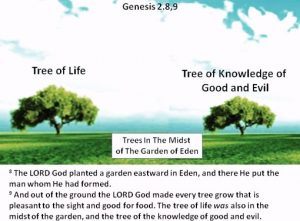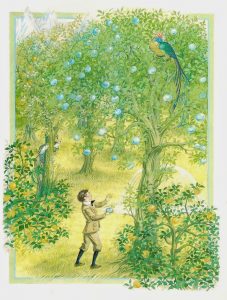Happy weekend, folks! Sorry it’s been so long; my teaching load has increased significantly more than I first expected. I hope to record/upload another YouTube video or two soon.
Something that’s been on my mind for a while is the morality of preserving life; people have been toying with the idea of healing/immortality since time immemorial. Today is no exception; increased medical proficiency, longer lifespans, and even the ideas of cloning or preserving consciousness in computers show how much people desire to live longer. The question is, why do people desire to live forever? How do we even begin to define life?
In Genesis 2, GOD plants two trees in the midst of the Garden of Eden; one is the Tree of Life (presumably, everlasting life), and the other is the Tree of Knowledge (of good and evil).
Only the latter tree is forbidden to Adam and Eve; the Knowledge tree represents the choice to reject GOD’s ultimate goodness. Adam and Eve (with coaxing from Satan) choose to eat of the Tree, and immediately afterward know that they have done evil. GOD drives them out of the Garden for two reasons: 1) anything imperfect would be destroyed by GOD’s presence, and 2) in their fallen state, if Adam and Eve were to eat of the Tree of Life, they would have no hope of redemption; they would be forever trapped in a life of pain, misery, and death.
In a previous post, I talked about Jadis, the White Witch from the Chronicles of Narnia. In “The Magician’s Nephew,” we learned that she destroyed her own world of Charn for the sake of power; once she enters Narnia, she makes another choice: she follows Digory (who later is known as Professor Kirke) as he fulfills a mission for Aslan and eats an apple from the Tree of Life.
She becomes immortal, but at a terrible price, as Aslan later tells us:
“Things always work according to their nature. She has won her heart’s desire; she has unwearying strength and endless days like a goddess. But length of days with an evil heart is only length of misery, and already she begins to know it. All get what they want – they do not always like it.”
A slightly different (but no less poignant) portrayal of this state-of-being is found in the story, “Tuck Everlasting.” A young girl, Winnie Foster, encounters a family that drank from a spring that was a “fountain of youth,” causing them to physically remain EXACTLY as they were when they drank from it. Angus Tuck, the father of the family, explains to Winnie just what living forever looks like from that perspective:
Keep in mind, Angus is not encouraging nihilism (life lived around death) or hedonism (rampant, unchecked pleasure); he’s encouraging Winnie to decide what is most important – living a life that makes a difference, making the world a better place, and not being afraid of death (if you know and trust Jesus as Lord and Savior, death no longer has power over you anyway 🙂 ).
The following clip is from the popular TV series “Stargate: SG-1;” in the episode “Holiday,” an old man named Machello has spent over 100 years fighting a parasitic race of aliens called Goa’uld. Believing that he deserves a second lifetime to make up for all the years of pain and sacrifice, he invents a device that causes two minds to switch bodies. He then tricks a young archeology professor named Dr. Daniel Jackson into activating the machine with him; Machello then leaves Daniel to die in the body of Machello while he (Machello) goes off to begin a new life in Daniel’s body. After being caught, Machello is confronted with the immorality and evil of what he has done – and what he has become as a result:
In making this post, I came across a quote from Socrates: it is better to suffer evil than to do it. Whether that means transplanting your mind into anther’s body, harvesting embryos to use their stem cells to heal disease, or any method to preserve physical life at the cost of morality, trying to keep yourself “alive” is a slippery slope that ultimately costs you Life itself.

